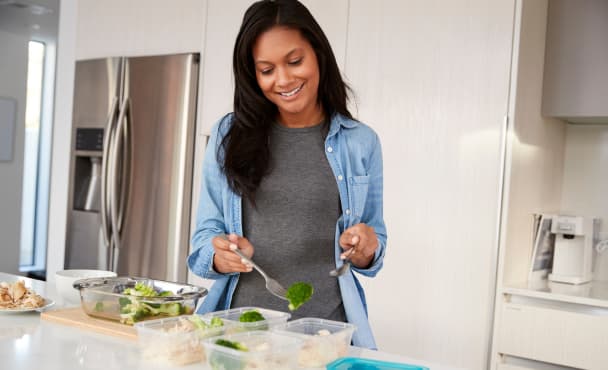The Iglu Guide | Blog
How to eat more sustainably on a student budget

If all our food waste were a country, it would place just behind America and China as one of the planet’s biggest pollutants. How crazy is that? But as part of the conscious consumer generation, here’s where students can really make a difference. Whilst we can’t always rely on government and big business to endorse climate-friendly policies, what we can do is examine our own habits and behaviours to understand how we can eat more sustainably – without blowing the budget. And whilst that might sound a daunting prospect for a busy student working on a small budget, it’s actually easier than you might think. Here’s how you can help.
Plan meals and shop smart
Let’s start with a fun fact: Over 60% of food waste comes from domestic households. That’s around 7.6 million tonnes of wasted food every year heading straight into the garbage – enough to fill the Melbourne Cricket Ground nine times over. Whilst we might not hold ourselves personally responsible, think about how many times you might have headed off to the supermarket with all the right intentions of shopping nutritiously, but returned home laden with special offers, quick meals and junk food. It’s a dangerous retail world out there for a hungry shopper, and the simple answer is to arrive prepared. Plan your meals for the week ahead, write out exactly what you need on a shopping list, and stick to it. This helps you avoid those impulse purchases, saves money and automatically creates less waste. Cook meals with your housemates to keep costs down even more and split out the expense. Less food waste equals sustainable living and money back in the bank.
Sustainability score: High!
Planning your meals out for the week ahead minimises food waste, reduces methane emissions and helps protect the planet from climate warming.
Eat less meat
Meat production accounts for over 55% of greenhouse gases, and the race to intensive farming encourages ongoing deforestation and an increasing loss of biodiversity. The pressure on farmers to mass produce meat at ever cheaper prices has decimated rural landscapes, pressurised the industry and sadly changed our environment forever. But that’s not to say we can’t make a difference. Rather than have to choose between eating meat or not eating meat, a good solution is to eat less, but eat better quality meat. By eating less meat you’re helping reduce your food budget as well as helping protect the climate. And when you do shop for meat, go to the local butcher and get some reassurances as to where your meat has actually come from – and you’ll be helping to support local and sustainable agriculture. To replace the protein in your diet on those meat-free days, choose beans, lentils, tofu and chickpea for tasty and cheaper alternatives.
Sustainability score: High!
Intensively farmed meat requires huge amounts of land that has been flattened and deforested to graze cattle. Reduce your supermarket meat consumption and choose better quality farm produce instead.
Buy local and seasonal
Buying food that’s in season is always a good idea, and usually a much cheaper alternative. It has travelled less food miles (always better for the environment), and is likely to be grown locally – which means it can be sold on to the consumer more cheaply. Australia benefits from a warm climate for much of the year, so it’s not uncommon to have an extended strawberry season for example. But there’s a reason it feels weird to eat mangos in winter… they definitely won’t be local and so do not make for a sustainable choice! Eating local foods helps connect you back to the environment where you are living, as well as benefiting the local farmers and businesses. Search for budget-friendly ingredients that are in season and consider buying in bulk for items like grains, beans, and frozen veggies. Check out your local farmer’s market for the best produce at the best prices.
Sustainability score: High!
Supporting local businesses and shopping local contributes to a sustainable future and preserves natural resources.
Minimise food waste
It’s time to have a good look around your kitchen at the end of every meal, no matter what you have eaten. How much waste are you creating when you prepare food? Are you using all parts of the vegetables? Are you freezing those excess portions for a later date? Are you composting your food scraps, or using the leftovers to create something new? It’s time to focus on our cooking behaviours, to stop and think before we simply scrap food waste into the bin. Not only does this help the budget, it’s a much more sustainable way to live.
- Only buy what you need from the shops
- Store food appropriately so that it doesn’t spoil
- Use leftovers creatively – create a repertoire of secondary recipes that match each meal – think stir-fries, soups, omelettes
- Always use newer produce from the fridge first to avoid foods expiring
- Compost your food scraps
Sustainability score: High!
Wasting less food helps minimise greenhouse gases and mitigate climate warming, contributing to a sustainable future.
Choose fresh foods
As a general rule, fresh foods are always a better, healthier choice than processed foods. The more ingredients listed in the food you buy, the more it has been altered from its original state. Not only is this bad for your general health, it takes an enormous amount of energy consumption. Ultra-processed foods often come with excessive packaging and are also more likely to contain palm or soy oils which are well known for their devastating impact on the environment in terms of deforestation. These types of food are also implicated in longer supply chains – which means there’s a greater chance of food wastage along the way. The more work that goes into producing a product, the higher the price for the consumer, and the higher the price for the environment. Protect your budget and protect your planet by shopping for fresh foods wherever you can. You’ll also benefit from a higher nutritional value with reduced additives necessary to keep the food ready to eat.
Sustainability score: High!
Fresh food requires less energy to produce, and less packaging to sell. Buying your fresh food locally is often cheaper, which makes it a sustainable and affordable choice.
Avoid over-packaging
We’re so consumed with seeking out healthy food options, we often overlook the effects of packing and how that impacts sustainability. The production and disposal of packaging material requires a significant amount of energy usage, and single-use packaging is taking a huge toll on the environment as it clogs up our landfill and waterways. Certain types of food packaging contains harmful chemical additives which can be detrimental to our health. In addition to this, certain materials are impossible to recycle and are directly headed into landfill. By choosing products with minimal or no packaging, we can use our consumer power to support those businesses that are conserving resources and minimising their environmental impact. This also supports a movement towards a circular economy, where resources are kept in use for as long as possible, with any waste minimised. Look for products that carry minimal packaging, and buy in bulk or use refill stations where possible. This can save lots of money in the long run and won’t upset your budget.
Sustainability score: High!
Minimal packaging helps conserve resources, reduces landfill and minimises carbon emissions.


